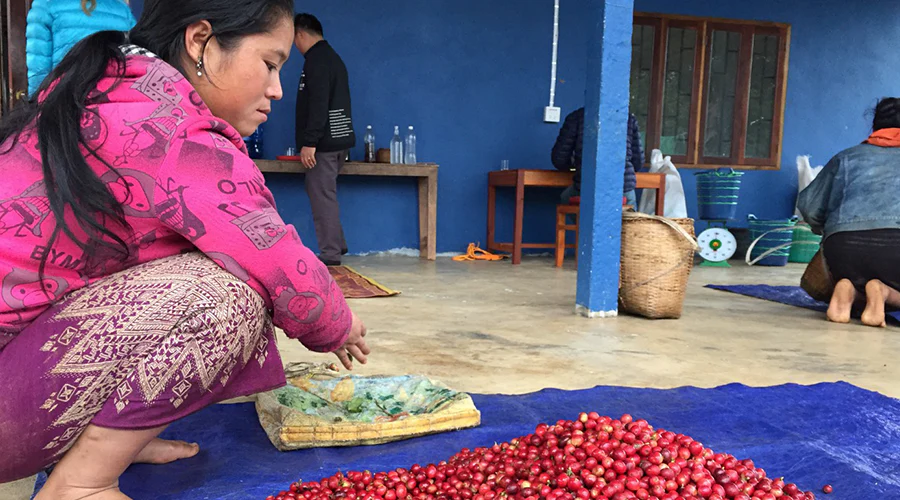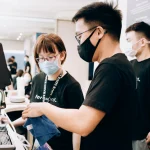Since the inception of Foreword, we have been pursuing specialty coffee from Asia. We chose to explore Asia as we saw the potential of high quality coffee originating from this part of the world comparable to the more established producers from African and South American countries. Besides, Singapore is located within Asia and it reduces our carbon footprint importing coffee in this region.

This was our trip in 2017. Boarding the small plane that brings us from Vientiane to Phonsavan/Xieng Khouang. There, we met up with Steve and had another 5–6hrs car ride to finally arrive at Sam Neua.
Beyond good coffee, Foreword places emphasis on working with good people. We are humbled to have known Steve Patton and Tyler Gant, co-founders of Yuni Coffee Co., since 2017 and we are inspired by the work that they are doing for the community in Northern Laos. It was serendipitous that a casual email from us 3 years ago asking for some coffee samples led to a trip to their farm where our friendship and business relationship grew from there.
For three years, we have been purchasing coffee from Yuni Coffee Co. and featuring their two microlot coffee (washed and natural) here in Singapore. Figuring out the shipping process from Laos to Singapore was rocky at the start, but we gained the experience over the years and the process became much smoother.
In this special interview, we caught hold of Tyler to share with us his experiences as a coffee producer at the upstream of the coffee value chain. Despite his busy schedule, Tyler took time to provide us with insights on how it’s like at the farms during this Covid-19 pandemic and how consumers can contribute to a more sustainable coffee value chain 🙂
Introducing Yuni Coffee Co and Northern Lao Coffee
Wei Jie: Hey Tyler, could you share more about yourself and Yuni Coffee?
Tyler: Sure, I’m happy to. I’m a father, husband, entrepreneur, and love coffee and people. For all of these reasons, I’ve been living and working in Laos for 6 years, and with my business partner, Steve, founded Yuni Coffee Co. (YCC) in 2015. The years since YCC’s inception have been the most challenging and rewarding time of my life. However, while here in Laos PDR with my family and working to improve the lives of northern Lao families through sustainable industry, there is no other place I’d rather be.

Tyler (at the foreground) volunteers his time and teaches English to a group of Laotian youth.
WJ: Where does Yuni Coffee lie in the coffee value chain? An exporter? A roaster? A cafe?
Tyler: YCC proudly, and somewhat uniquely, has forged its own link in nearly every section of the value chain. Most saliently, we work hands-on with farmers, cultivating coffee from seed to harvest. We oversee three wet-processing mills, and then also run our own dry-mill. From there, our coffees go one of two paths — to our roastery, or to port and shipped around the world. Our roastery serves only the Lao domestic market, and providing fresh coffee for our cafe in Sam Neua City and other coffee-lovers around the country who put in direct orders. We certainly stay busy, but we are proud to be an employer in the private sector of our developing community and to bring recognition to the farmers and coffees from this region.

YCC’s cafe at Sam Nuea. Photo from: Yuni Coffee Co.
WJ: Could you tell us more about the coffee grown in Laos? How are these coffee being discovered / planted?
Tyler: When speaking of Lao coffee, we can distinguish Northern Lao coffee and coffee from the Bolaven Plateau in southern Laos. The latter has been a strong coffee producer since the time of French colonialism. Northern Lao Coffee, however, is on the rise and developing quickly. Rugged mountainous terrain and ancient forests create a perfect, pristine environment for planting organic, natural canopy shade-grown coffee. The potential of these idyllic conditions are still yet to be realized. YCC is just one of a handful of companies seeking to promote Northern Lao Coffee as a special coffee origin, and also coffee cultivation as means of socio-economic development for many villages and families. As infrastructure, technical knowledge, and market opportunities grow and develop, look for more interesting coffees to began to become available from Northern Laos. Now, new varietals are being tested, and we at YCC are really excited to taste the results.

Coffee plants (the short shrubs) are grown among the trees on the mountains. Steep slopes make it difficult and potentially dangerous for coffee cherry pickers.
Community Development and Relationship Coffee
WJ: “Yuni” means “here” in the Lao language and we understand the importance of community development as part of Yuni’s commitment to create change here in the farms. How does Yuni Coffee contribute to the community in Laos?
Tyler: YCC was founded with the desire to be present and hands-on with coffee-growing communities to not only ensure the quality of coffee produced, but to also gain an understanding of life for the farmers we work with. Over the years, we have witnessed first-hand the challenges and hardships of living in developing, rural areas. We are thankful for the opportunity to bring industry and economic development to these areas, and also for the capacity to share profits with communities in times of natural disasters, such as droughts, floods and landslides. Being on-site, living within the communities where our coffees come from, we are sometimes the first entity able to respond to an immediate need, providing rice, clothing, housing materials. As we grow as a company, YCC is also planning to begin other community initiatives related to health and education soon.
WJ: What does “relationship coffee” and “direct trade” mean to you?
Tyler: “Relationship coffee” or “direct trade” means communication between all entities — growers, processors, exporters, roasters, and consumers — until the coffee is consumed as a beverage. In 2020, this kind of communication is possible. Transparency, understanding, and good-will is being cultivated in a profound way among all stakeholders to create very specific and unique supply chains from farm to cup.
WJ: What are the challenges of exporting coffee from the rural areas in Laos to the rest of the world and how do you overcome them?
Preserving the authenticity and possibility of “relationship coffee,” however, is no small feat. While communication has become as easy as a few swipes on a touchscreen, logistical challenges remain when we are talking about a physically bulky product being moved from point A to point B, all while preserving quality, freshness, and traceability. This is the arena where YCC works tirelessly to facilitate the safe, trackable movement of our coffee from rural communities out of landlocked Laos and to specialty roasters worldwide. While we are willing to take on these challenges, of course our job would be impossible without our customers’ demand for our unique product and in so doing, we all together support the producer communities.
Sustainability of the Coffee Value Chain Despite the Pandemic
WJ: How has Covid-19 impacted your business? Did you have to change the way you do business or to venture into new businesses to stay relevant?
Tyler: During this unprecedented time on Earth, even in our small corner of the globe, YCC has not been exempted from the impact of Covid-19. Thankfully, Lao PDR as a country has been largely unaffected in terms of Covid-19 cases/deaths due to border shut-downs, and stay-in-place measures. However, the indirect impact on the national economy and infrastructure has caused shipping delays for our 2020 crop, necessitated closures and slow sales in our cafe, and restrained us from visiting certain villages to provide scheduled training for a 2-month period. We’re still working to undo some of the complications, but we are thankful that all of our partners, staff, and our families have remained safe and healthy during these days. We’re also thankful for our local customers in Sam Neua City who faithfully visit our cafe at a time when tourist and out-of-state visitors are reduced to keep our cafe going.
WJ: How, in your opinion, can coffee drinkers contribute to a more sustainable coffee value chain? What do you want coffee drinkers to know about the coffee value chain from the perspective of a producer?
Tyler: Coffee drinkers, the ultimate consumer, are vital to the sustainable coffee industry. Informed, conscious consumers who choose traceable coffees that are ethically traded allow for the possibility of this kind of coffee to even exist uniquely in the marketplace. Think about it: coffees from all remote corners of the world are showing up intact on your local roasters’ shelves — its an unbelievable feat of logistics and cooperation unlike any other “commodity”!
Then, as such conscious coffee drinkers ask good questions, get to know the unique origins, and ultimately select a high-quality specialty coffee, they are contributing directly to the community that produced the product. While this in and of itself is an amazing benefit to society, ultimately the informed coffee drinker is rewarded with a unique and tasty reward in their cup. As a partner of producers, we of course want to thank those who choose our coffee. Their demand for specialty coffee truly changes lives!

Ripened coffee cherries are picked and go through sorting by hand.
WJ: What do you think of the future of Lao coffee and the specialty coffee industry in the years to come?
Tyler: The future of Lao coffee is bright, and I suspect Northern Lao Coffee will begin to emerge more even on the international coffee scene as production, quality and visibility increases, similar to perhaps the recent rise of Myanmar coffee. Local coffee producers are benefiting from specialty coffee partners (mills, exporters, roasters, etc.), as does the consumer, who is now gaining access to a brand new origin.

Coffee cherries are dried on raised beds to ensure circulation and the shed helps protect them from the elements.
WJ: Any other thoughts to share or questions you like to leave us with?
Tyler: YCC is so thankful to be a partner of Foreword Coffee as they lead Singapore and even the world in thoughtful efforts to constantly improve the sustainability and ethics of the coffee industry at EVERY point in the supply chain. We love what Foreword stands for, and we will be “all-in” with you for years to come! Coffee lovers, please join in on what Foreword Coffee is doing!





